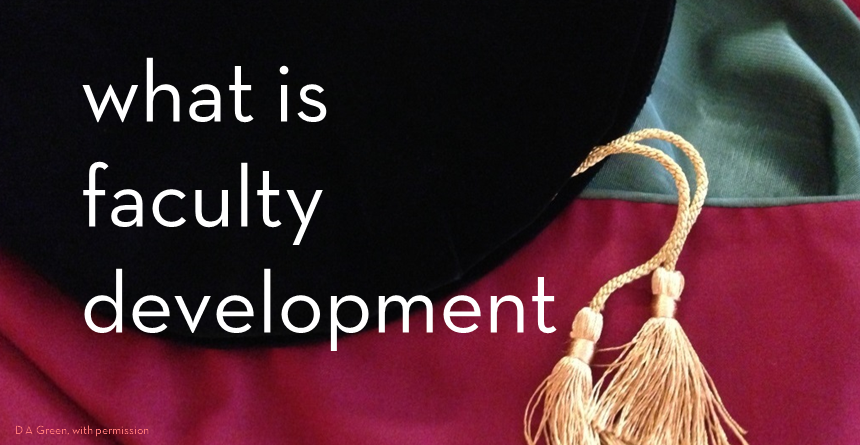
Faculty Development

Faculty Development is a sub-discipline of higher education research and practice. It is described as: "systematic and scholarly support for improving both educational processes and the practices and capabilities of educators" (Stefani, 2003, p. 9). While "faculty development" is a common term in North America for this field, in other parts of the English-speaking world, it is called "educational development" or "academic development."
In 2013, our center changed its name from the Center for Excellence in Teaching and Learning (CETL) to the Center for Faculty Development in response to faculty feedback. We still tend to use the acronym CETL (see-tull).
Below is an explanation of our name change and some background on our decision-making process.
Why stop using the name "Center for Excellence in Teaching and Learning"?
Our previous name implied that we only supported faculty on questions of teaching and learning. In fact, since 2007, we've been doing much more than that, so the change of name better reflects our work. The Center supports
- Learning and teaching (since 2004)
- SoTL—Scholarship of teaching and learning (since 2005)
- Research practice (since 2007)
- Professional development (since 2007)
- Academic leadership (since 2011)
At the time of our name change, "learning and teaching" still made up the majority of our work with faculty. For more recent data, please check our latest annual report.
When Jacquelyn Miller joined the Center in September 2012 to focus on faculty professional development, we knew the time was right to change our name to describe the work that we perform more accurately.
Why use the name "Center for Faculty Development"?
In Winter Quarter 2013, we wrote to all faculty who had used CETL's services in the previous two years to gather their feedback on a possible change of name. Here's the outcome:
- 107 individuals replied to our survey – thank you!
- 65.4% of respondents thought we should change our name.
- Of the shortlisted names we suggested, "Center for Faculty Development" was most popular, with 48.8% of faculty making it their first choice.
This new name has the advantages of being immediately understandable to faculty, of reflecting a common US name for the academic field in which we work, and of encompassing the work we do in the five areas listed above.
We're excited about this new stage in the Center's development, and we will continue to work in the spirit of CETL's founding principles. Our work with faculty remains voluntary, formative, and confidential, as we support faculty in their professional lives so that they gain real satisfaction from being a faculty member at Seattle University.
As ever, we welcome your feedback.
Your Faculty Development colleagues,
David Green, Jacquelyn Miller, & Katherine Raichle
Reference:
Stefani, L. (2003). What is staff and educational development? In P. Kahn, P. & D. Baume (Eds.), A guide to staff and educational development (pp. 9–23). SEDA Series. London: Kogan Page.
Further reading and resources on Faculty Development
Baume, D., & Kahn, P. (Eds.) (2004). Enhancing staff and educational development. SEDA Series. London: RoutledgeFalmer.
Baume, D., & Popovic, C. (Eds.) (2016). Advancing practice in academic development. SEDA Series. New York & London: Routledge.
Eggins, H., & Macdonald, R. (Eds.) (2003). The scholarship of academic development. Buckingham, UK: Society for Research into Higher Education/Open University Press.
Gillespie, K. H. (Ed.) (2002). A guide to faculty development: Practice advice, examples, and resources. Bolton, MA: Anker. [Available on loan from the Center's Library]
Gillespie, K. J., & Robertson, D. L. (2010). A guide to faculty development (2nd ed.). San Francisco: Jossey-Bass. [Available on loan from the Center's Library]
International Consortium for Educational Development (ICED). The international faculty developers' association. http://icedonline.net
International Journal for Academic Development (IJAD). The peer-reviewed journal of ICED. [Available online via SU Library]
Kahn, P., & Baume, D. (Eds.) (2003). A guide to staff and educational development. SEDA Series. London: Kogan Page. [Available on loan from the Center's Library]
Land, R. (2004). Educational development: Discourse, Identity and Practice. Maidenhead, UK: Society for Research into Higher Education and Open University Press.
Macdonald, R., & Wisdom, J. (Eds.) (2002). Academic and educational development: Research, evaluation and changing practice in higher education. SEDA Series. London: Kogan Page.
Professional & Organizational Development Network in Higher Education (POD Network). US faculty developers' association. http://www.podnetwork.org/
Schroeder, C. M. (2011). Coming in from the margins: Faculty development's emerging organizational development role in institutional change. Sterling, VA: Stylus. [Available on loan from the Center's Library]
Sorcinelli, M. D., Austin, A. E., Eddy, P. L., & Beach, A. L. (2006). Creating the future of faculty development: Learning from the past, understanding the present. Bolton, MA: Anker. [Available on loan from the Center's Library]